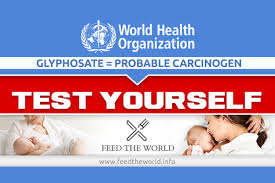Feed the World: Ban Glyphosate: Take the Test
 On March 20, 2015, the World Health Organization’s cancer agency IARC declared that glyphosate is a probable human carcinogen. IARC reached its decision based on the review of 17 top cancer experts from 11 countries, who met to assess the carcinogenicity of 5 pesticides.This, as well as many other studies conducted by leading scientists around the world, has prompted the need for a world-wide ban on glyphosate. Feed the World is organizing this important movement but we need your help!
On March 20, 2015, the World Health Organization’s cancer agency IARC declared that glyphosate is a probable human carcinogen. IARC reached its decision based on the review of 17 top cancer experts from 11 countries, who met to assess the carcinogenicity of 5 pesticides.This, as well as many other studies conducted by leading scientists around the world, has prompted the need for a world-wide ban on glyphosate. Feed the World is organizing this important movement but we need your help!
First, here are some things you should know about glyphosate:
- GM crops accounted for 45.2% of the total global glyphosate demand in 2012. (1)
- 94% of soybeans, 89% of corn and 91% of cotton grown in the United States are herbicide-tolerant (HT) crops. (2)
- Glyphosate-tolerant crops represent more than 80% of the 170 million acres of U.S. farmland. (3) (4)
- The global glyphosate herbicides market was valued at USD 5.46 billion in 2012 and is expected to reach USD 8.79 billion by 2019. (5)
Glyphosate is patented as:
- an Antibiotic – leading to concerns about possible harm including the killing of beneficial gut bacteria which causes immune system damage. (6)
- a Chelating Agent – Although glyphosate can be rapidly immobilized in soil (also spray tank mixtures, and plants) through chelation with various cat-ions (Ca, Mg, Cu, Fe, Mn, Ni, Zn), it is not readily degraded and can accumulate for years (in both soils and perennial plants). Glyphosate’s chelation properties may lead to possible harm such as vitamin and mineral deficiencies. (7)
 Glyphosate has been linked to many severe health effects and diseases. Learn more here.
Glyphosate has been linked to many severe health effects and diseases. Learn more here.
Glyphosate is also used on nearly 160 different non-gmo crops and is used as a drying agent before harvest.
Here is how you can help!
Feed the World is an organization that has one single aim: To protect women and children from the harmful effects of toxic chemicals in our food and in our environment. Their first project is to ban glyphosate – the world’s most used herbicide. By the end of 2018 we aim to have created enough pressure on regulators and glyphosate producing corporations to see a full ban on the sales of this harmful chemical in the U.S. Please take a few minutes to watch this important movie about glyphosate:
https://www.youtube.com/watch?v=eAEEDluI_s0
Take the test! We are asking everyone that can to get tested for glyphosate contamination. Take the test here.
Another idea is to have your water tested where you live. This information will be so valuable to counter the claims of the biotech industry that states that glyphosate degrades or is neutralized in soil. It does not! See information here. The more evidence we gather, the quicker we can ban this toxic herbicide.
Please share this post with everyone! We need all hands on deck!
 Let’s get glyphosate banned before any more damage is done to the environment and to human health! Your children, grandchildren and generations to come will thank you!
Let’s get glyphosate banned before any more damage is done to the environment and to human health! Your children, grandchildren and generations to come will thank you!
If you would like to donate to Food Integrity Now to help us cover costs of creating podcasts and articles, click here for a $10 donation [ssd] If you would like to donate a different amount, click on the Donate Button on the right of this post. We are funded by your donations! Thank you.
References:
- http://www.prweb.com/releases/2014/08/prweb12107677.htm
- http://www.ers.usda.gov/data-products/adoption-of-genetically-engineered-crops-in-the-us/recent-trends-in-ge-adoption.aspx
- http://www.isaaa.org/resources/publications/pocketk/16/
- http://water.usgs.gov/nawqa/pnsp/usage/maps/show_map.php?year=2012&map=GLYPHOSATE&hilo=H
- http://www.transparencymarketresearch.com/glyphosate-market.html
- http://patft.uspto.gov/netacgi/nph-Parser?Sect1=PTO2&Sect2=HITOFF&u=%2Fnetahtml%2FPTO%2Fsearch-adv.htm&r=1&p=1&f=G&l=50&d=PTXT&S1=7771736&OS=7771736&RS=7771736
- http://www.archpatent.com/patents/3160632

why only u.s.a ?